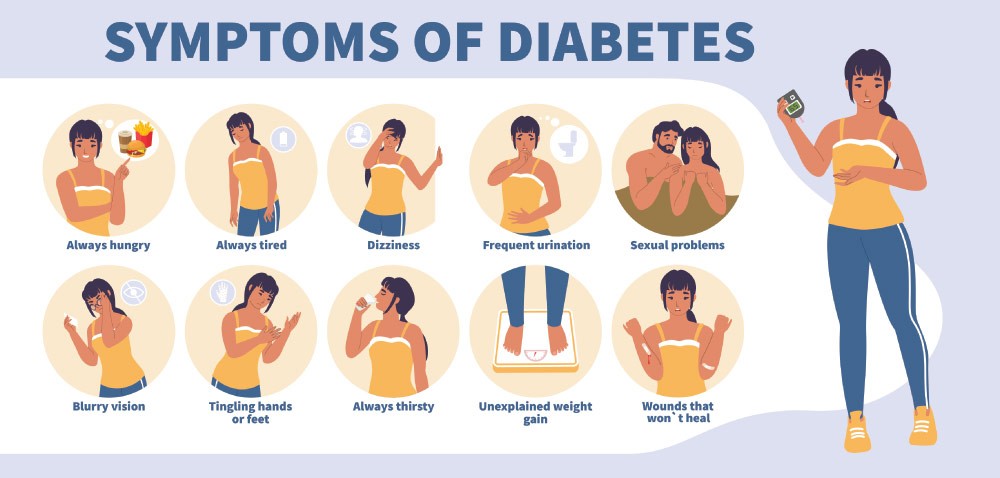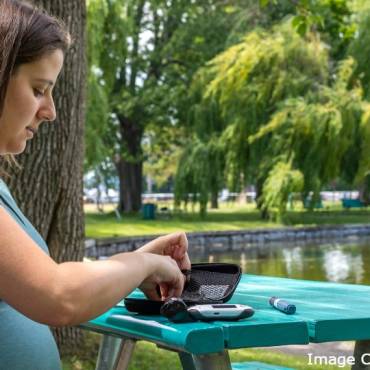We all are aware of the bad effects of diabetes; it is one of the most lethal diseases in the world today, targeting every 2nd and 3rd person. You must have come across the number of individuals developing diabetes symptoms increasing at an alarming rate every year. Though diabetes is a lifelong health condition still, one can deal with it smartly. You can control this health condition by following the right diet plan and basic lifestyle changes. Alternatively, taking the treatments for diabetes is another option that is mostly preferred as they find themselves unable to follow a diet and improve their lifestyle. If you are a woman and you are diagnosed with diabetes, don’t worry; you have so many solutions to cure your disease. Just continue scrolling to know more.
Things to know about Diabetes Symptoms in Women:
Diabetes is also referred to as diabetes mellitus. This is a condition in which your body causes blood glucose (sugar) levels to rise higher than normal. High blood glucose levels may result from inadequate insulin production, which means your body is not responding properly.
There are mainly three types of diabetes reported, and these are:
Types of Diabetes
Type 1 Diabetes: Type 1 diabetes, or juvenile Diabetes or insulin-dependent Diabetes, is a chronic condition in which the pancreas produces little or no insulin in your body.
Type 2 Diabetes: Type 2 diabetes is the most common form. If you have type 2 diabetes symptoms, it means your body does not use insulin properly, or it becomes insensitive to insulin. This is called insulin resistance.
Gestational Diabetes: Gestational Diabetes is known to affect women during their pregnancy. Some females may experience a spike in their blood sugar levels, and their bodies may not be able to produce enough insulin. This leads to progressively rising levels of glucose.
However, many signs of diabetes in men and women are similar. But still, few symptoms are unique in the case of women. Understanding more intensely about these symptoms of diabetes type 1 and 2 may help you identify diabetes at an early stage and get treatment early.
Early signs of diabetes in men and women
Early signs of diabetes in women may not seem obvious, especially if you aren’t looking for them. But speaking to your doctor if you have possible symptoms is important. The early signs of diabetes in women can include:
1. Frequent visits to the bathroom: Urinating more often may be an early symptom of diabetes. Pregnant and older females may urinate more, so you may overlook this sign.
2. Increased thirst: If you are feeling thirstier than usual throughout the day. It may not seem unusual. But it might be one of the first signs of diabetes.
3. A decreased sex drive: If you have diabetes, you may be less interested in sex. The metabolic disorder may cause vaginal dryness and nerve damage, making intercourse less pleasurable.
4. Unintentional weight loss: If you keep losing weight but aren’t even trying, speak to your health care specialist. Losing weight without explanation may be one of the early signs of diabetes.
5. Skin discoloration: If you have diabetes, you may notice that your skin in certain areas has become darker. It’s become more visible on the neck, the groin, and armpits.
6. Worsening of vision: Untreated Diabetes may damage tiny blood vessels, including those in the eyes. This may result in loss of vision or even blindness over time.
These signs and symptoms of diabetes are often subtle, but they can be severe. Diabetes symptoms men also include erectile dysfunction, reduced muscle mass, and genital thrush. Diabetes is not the only possible cause of many of these symptoms. Other lifestyle issues, lifestyle habits, or medications may be the culprit. When in doubt, contact a doctor.
Diabetes symptoms unique to women, signs of diabetes in women include:
1. Vaginal and oral yeast infections and vaginal thrush
An overgrowth of yeast caused by the Candida albicans fungus can cause oral yeast infections, vaginal yeast infections, and vaginal thrush. These infections are very common in women. When these infections develop in the vaginal area, the following diabetes symptoms women occur:
• Vaginal itching and soreness
• Vaginal discharge
• Painful intercourse
Oral yeast infections include:
• White coating on the tongue and inside the mouth
• Swollen red gums or inner cheeks
• Trouble eating or swallowing
2. Urinary infections
UTIs develop when bacteria enter the urinary tract. If these symptoms of type 2 diabetes in women aren’t treated, there’s a risk of kidney infection.
These infections can cause:
• painful urination
• bloody or cloudy urine
• burning sensation
3. Female sexual dysfunction
Diabetic neuropathy occurs when high blood glucose damages nerve fibers in your body. This can trigger tingling and loss of feeling in different parts of your body, such as hands, legs, and feet. It also affects the sensation in the vaginal area, lowering a woman’s sex drive.
4. Polycystic ovary syndrome
Polycystic ovary syndrome occurs when a person produces a higher number of male hormones and is predisposed to getting PCOS. The symptoms of this disease include:
• weight gain
• irregular periods
• acne
• depression
• infertility
5. Heavier menstrual flow:
Due to hormone changes, your blood glucose levels may fluctuate during the menstrual cycle. You may observe that your periods are longer, with a heavier flow.
6. Trouble conceiving:
Women who have diabetes may have a tougher time conceiving. If you have difficulty getting pregnant. Seek immediate medical advice.
7. Pregnancy complications:
In women, diabetes increases the risk of miscarriage and preeclampsia (very high blood pressure) at the time of pregnancy. In addition, babies may be born prematurely or have high birth weights.
8. Weight gain after menopause:
A lot of women gain weight after menopause, but diabetes may increase the risk. Hormonal changes may directly impact blood sugar levels, affecting your weight.
You can help prevent signs of type 2 diabetes by adopting a healthy lifestyle. Always be on top of your health if you are at increased risk of developing diabetes. Visit your health care professional to check your blood glucose levels if you develop any of the above sugar symptoms.
Also Read: Understanding Bladder Infections: Causes, Symptoms, and Treatment



